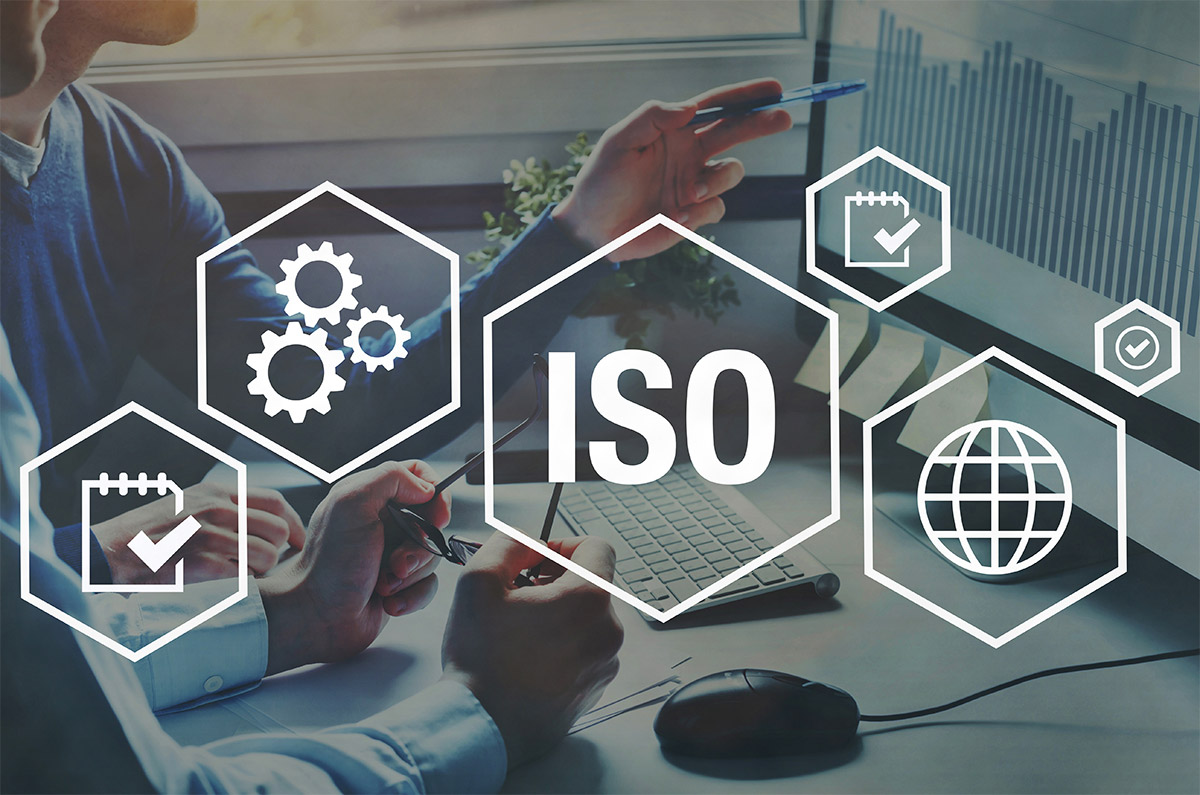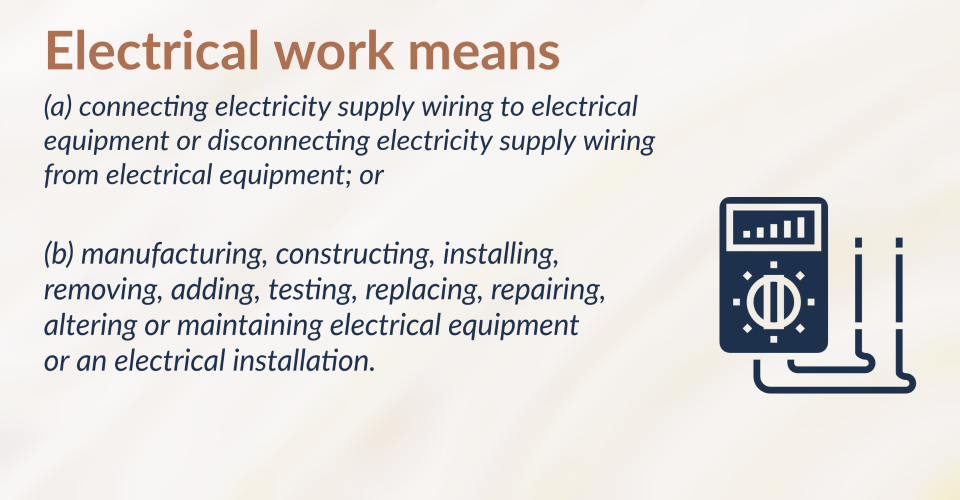
Plumber vs Electrician SEO
- Oct 24 2025
- /
- 360

Australian Standards® and Australian/New Zealand Standards ("the Standards") are developed by an independent Non-Government Organisation (NGO) called Standards Australia. Standards Australia is the country's leading independent, NGO, not-for-profit standards organisation.
Standards Australia prepares and publishes voluntary technical and commercial standards that are often used as the basis for occupational safety and health regulations in the workplace and the public realm. Standards are also incorporated into many legal contracts.
The Standards are developed by consensus through expert committees, academics and researchers, and input from business and industry leaders.
Standards set out specifications, procedures and guidelines that aim to ensure products, services, and systems are safe, consistent, and reliable. They cover a variety of subjects, including consumer products and services, the environment, construction, energy and water utilities et cetera.
While the Standards are not legal documents, many Australian Standards® or joint Australian/New Zealand Standards (AS/NZS) are adopted into Commonwealth, State and Territory legislation and therefore become mandatory.
Standards Australia was established in 1922 and is celebrating its centenary year in 2022, claiming a contribution to:
100 years of driving innovation.
100 years of empowering imagination.
100 years of keeping Australians safe.
Over the last 100 years, individuals from technical, business, academic, government and community backgrounds have contributed their expertise to developing standards. Helping make Australia a safer and more efficient country.
https://www.standards.org.au/centenary/centenary-home
Standards Australia enjoys international influence having joined the International Electrotechnical Commission (IEC) in 1925 and as the Australian Member and a co-founder of the world's most important standards organisations in 1947, the International Organization for Standardization (ISO). Involvement with ISO and IEC takes place at two levels: – policy and technical participation.
In 1998, Standards Australia was recognised as Australia's peak non-government (NGO) standards organisation.
Standards are regularly reviewed by Standards Australia technical committees to ensure they keep pace with new technologies.
International standards are developed by ISO, IEC, and International Telecommunications Union (ITU) for countries to adopt for national use. An agency of the United Nations, headquartered in Geneva, the ITU is the body through which governments and the private sector coordinate global telecommunications networks and services. Standards Australia embraces the development and adoption of international standards.

Regional standards are prepared by a specific region, such as the European Union's EN standards.
Under the Closer Economic Relations agreement, Standards Australia maintains a strong working relationship with Standards New Zealand. A formal agreement is in place that sees these organisations prepare and publish joint standards where appropriate.(See the Joint Standards Fact Sheet for more information).
National standards are developed either by a national standards body like Standards Australia or other accredited bodies. Any standards developed under the Australian Standard® name have been created in Australia or are adoptions of international or other standards.
Standards Australia claims that Standards:
"ensure the quality and consistency of products and services, giving businesses and consumers greater peace of mind. They also benefit the economy, improve health and safety, protect our natural resources, and improve our quality of life."
Standards Australia®
Standards Australia cites 6 key benefits of the Standards:
1. Boost confidence: Thanks to standards, businesses and consumers can feel confident that the products and services they develop and/or use are safe, reliable and fit-for-purpose.
2. Enhance innovation: Standards are a launch pad for exciting new ideas. They can be created, evolved or discarded according to our changing world. New standards are developed to reflect the latest technologies, innovations and community needs.
3. Give products a competitive edge: In the eyes of consumers, products that comply with Australian Standards® offer added value. International Standards give Australian exporters an instant competitive advantage when moving into overseas markets.
4. Reduce barriers to international trade: Regardless of where a product is made, standards mean it can be sold and used around the globe. Opening new doors to international trade, standards help Australian businesses compete globally and to a wider market.
5. Reduce red tape: Standards assist with harmonisation across Australia's laws and regulations. They offer an alternative to regulation, reducing business costs and decreasing red tape, but still providing security for businesses and consumers.
6. Help businesses thrive: Standards are central to Australian business. They make business transactions simpler and more efficient, assisting with risk mitigation and compliance. Put simply, standards help our businesses thrive.
https://www.standards.org.au/standards-development/what-is-standard
Safety standards exists where goods must comply with rules for the performance, composition, contents, methods of manufacture or processing, design, construction, finish or packaging.
If you sell products to Australian customers, including the sale of products online, you must meet product safety requirements under Australian Consumer Law.
There are two types of mandatory product standards:
Suppliers must comply with mandatory standards to sell products in Australia and must also comply with other product safety rules such as product bans and recalls. Mandatory standards, product safety, bans and recalls are law. There are penalties and consequences if suppliers sell products that do not comply.
Suppliers include retailers, wholesalers, distributors, importers or manufacturers.
https://www.productsafety.gov.au/about-us/australian-product-safety-system
Product safety regulations in Australia for general consumer goods is a shared responsibility between the Australian Competition and Consumer Commission (ACCC) and States and Territory product safety regulators.
Other government agencies are also responsible for regulating the safety of products and services in a range of industries and activities including:
https://www.productsafety.gov.au/about-us/who-regulates-what
The difference between the terms food safety and food quality can be confusing.
Food safety refers to the hazards, whether chronic or acute, that may make food injurious to the health of the consumer. Food safety is not negotiable.
Food quality encompasses the attributes that influence a product's value to the consumer. This includes negative attributes such as spoilage, contamination, discoloration, off-odours and positive attributes such as the origin, colour, flavour, texture, ingredients and the food processing method.
The distinction between safety and quality has implications for public policy and influences the nature and content of the food control system most suited to meet predetermined national objectives.
The Australia New Zealand Food Standards Code ("the Code") sets legal requirements for the labelling, composition, safety, handling, and primary production and processing of food in Australia.
https://www.foodstandards.gov.au/code/Pages/default.aspx
The Code FSANZ develops standards that regulate the use of ingredients, processing aids, colourings, additives, vitamins and minerals. The Food Standards Code also covers the composition of some foods, such as dairy, meat and beverages as well as foods developed by new technologies such as genetically modified foods.
https://www.fao.org/3/y8705e/y8705e03.htm
The Therapeutic Goods Administration (TGA) is Australia's regulatory authority for therapeutic goods such as medicines, medical devices, and diagnostic tests.
The TGA is part of the Australian Government Department of Health, and is responsible for regulating therapeutic goods including prescription medicines, vaccines, sunscreens, vitamins and minerals, medical devices, blood and blood products.
Almost any product for which therapeutic claims are made must be entered in the Australian Register of Therapeutic Goods (ARTG) before it can be supplied in Australia.
"The TGA safeguards and enhances the health of the Australian community through effective and timely regulation of therapeutic goods."
https://www.tga.gov.au/tga-basics
The TGA does not regulate:
The ACCC provides product safety guidance for online sellers (eg websites and shopping carts). Its tips, information and factsheets on how to comply with mandatory standards will assist in the sale of safe consumer products online.
Online product safety and the mandatory standards apply to local Australian businesses and international overseas-based businesses who sell to Australian consumers via the internet.
An ACCC guide for online sellers can be found at:
https://www.accc.gov.au/system/files/Consumer%20product%20safety%20online.pdf
For example ACCC instructions to help consumers make a safe and confident purchase online, always provide:
Product safety information for consumers in Queensland can be accessed at:
https://www.qld.gov.au/law/your-rights/consumer-rights-complaints-and-scams/product-safety-for-consumers
The International Organization for Standardization (ISO) is the world's largest developer and publisher of International Standards. Over 20 million businesses worldwide are certified or recognized by ISO.
Participation in the global market requires compliance with ISDO. Wherever possible, Standards Australia adopt International Standards.If there are no existing or relevant international or regional standards, national standards may be developed.
The World Trade Organization (WTO) Agreement on Technical Barriers to Trade (TBT) requires members to use international standards (or the relevant parts of them) as a basis for their technical regulations, where possible. WTO TBT also requires that members use international standards as a basis for national standard development wherever appropriate.
Standards Australia is a founding member of the Pacific Area Standards Congress (PASC) and closely cooperates with the Australian Government in the standards and conformance activities of Asia-Pacific Economic Cooperation (APEC) and the Association of Southeast Asian Nations (ASEAN-CER).
https://www.standards.org.au/standards-catalogue/international/iso
The Australian Government,in a 2016 report on Australian Standards,maintained:
Every country needs a sound standards and conformance infrastructure to achieve its societal and economic goals. Increasingly all nations need to fully engage in the global economy and leverage the benefits of international trade to enable continued income growth and the economic wellbeing of their people.
We are living in a world that is undergoing profound transformations at all levels. Economies have never been more interdependent. Today, products that are consumed in one market are no longer made in one country; they are made in the world… Small and medium enterprises (SMEs) that use International Standards will find it easier to get their products certified and are better able to compete and sell anywhere in the world.
With International Standards SMEs are able to take part in global value chains and benefit from technology transfer. Countries that have mainstreamed International Standards in their policies and regulations are able to better protect their populations and give them a bigger choice of quality products.
International Standards stimulate trade, overcome artificial trade barriers and help level the playing field. This makes companies, industries and economies more competitive, making it easier for them to export, and stimulates diversification nationally and internationally.
(Australia's Standards and Conformance Infrastructure. An Essential Foundation. Australian Government. Department of Industry, Innovation and Science. July 2016.)
ISO 9001 sets out the criteria for a quality management system. It can be used by any organization, large or small, regardless of its field of activity.
Achieving an ISO 9001 standard promotes communication of your organisation's Quality Management System (QMS) to all workers, clients and other relevant parties.
There are over one million companies and organizations in over 170 countries certified to ISO 9001.
It's important that businesses have Policies, Procedures and Forms that are consistent with the ISO 9001 framework especially when dealing with overseas clients and the export of products and services.
https://www.iso.org/iso-9001-quality-management.html
ISO 14001 is an internationally agreed standard that sets out the requirements for an environmental management system.
The purpose of ISO 14001 is to provide organizations with a framework to protect the environment and respond to changing environmental conditions in balance with socio-economic needs. It specifies requirements that enable an organization to achieve the intended outcomes it sets for its environmental management system.
A systematic approach to environmental management can provide top management with information to build success over the long term and create options for contributing to sustainable development by:
https://www.iso.org/obp/ui/#iso:std:iso:14001:ed-3:v1:en
Increasingly, stakeholders, governments, existing and potential clients around the globe are looking towards engagement with businesses, product manufacturers and service providers that are behaving responsibly and sustainably in relation to improving and minimalising their environmental impacts.
Every Standard should demonstrate a positive net benefit. This means each standard can have a positive impact on relevant communities. Net benefit is central to how we should operate. The value or benefit of each Australian Standard® must outweigh its costs to society.
To assess net benefits, we should examine:
https://www.standards.org.au/standards-development/what-is-standard
Currently there is limited free public access to standards. Some public libraries maintain access to standards, so contact your local library to see if a subscription is maintained to Australian Standards®. Standards can be purchased online, including from the Standards Australia Store.
In 2019, following extensive consultation, Standards Australia released their Distribution and Policy Framework, recognising the benefit of providing access to Australian standards via public libraries and directly by Standards Australia.
Standards Australia are currently accelerating the development of new product distribution models that are designed to allow them to fund access to content for personal, domestic and household use by 2023.
FRAUD NOTICE
Please be aware there are certain websites purporting to offer Australian Standard® brand standards for sale that are not authorised or controlled by Standards Australia Limited. People wishing to purchase Australian Standard® brand standards or any other Australian Standard® publications can do so at Standards Store or from registered distributors.
Standards Australia®
Currently the only means to access Standards Australia data base is by the following method:
1. Go to Federation University Library at federation.edu.au/library.
2. Select the Databases tab and Search by database A-Z list.
3. Enter title search terms "Australian Standards Online" in the Find databases box or.
4. Click on "A" and scroll down to the Australian Standards Online database link.
At time of writing, Standards Australia have created and/or adopted over 28,500 standards and technical publications.
When applying a chemical system for pest control, a QBCC licence is required (Queensland) in addition to a Government issued (occupational) Pest Control Operator's licence.
Tony's Termites and Pest Control Gold Coast uses chemicals in their termite and pest control systems that are approved by The Australian Pesticides and Veterinary Medicines Authority (APVMA); Australian Standards® - Recommended common names for pesticides; and the National Registration Scheme for Agricultural and Veterinary Chemicals (NRS). Refer Pest Control Standards

Cameron Constructions- https://www.cameronconstructions.com.au/, Quality, Prestige and Custom Home Builders, Gold Coast, are members of both Master Builders Queensland and the Housing Industry Association. The MBQ and HIA have adopted Australian Standards® to "help maintain safety, efficiency and cost effectiveness of building in Australia." Standards such as AS 1684 – Residential timber-framed construction, outline the rules, guidelines and detailed technical specifications contained in numerous industry regulations, including the National Construction Code.

Reliable Pool Care Gold Coast https://www.reliablepoolcare.com.au/, offer pool maintenance services and are licensed to conduct pool safety inspections and issue Pool Safety Certificates for residential properties (every 2 years) and commercial properties (annually) as required by Queensland laws. In Queensland, pool fences and pool-gate safety latches must adhere to the safety standards as set out in Australian Standards®.
Commercial and residential painters often work with potentially hazardous materials. As professionals within the Surface Coating Industry, Gold Coast painters, Creations in Colour https://www.creationsincolour.com.au, are members of the Master Painters Association (Queensland), the professional industry organisation who set Standards such as AS/NZS 2311 Guide to the Painting of Buildings for painting services in the commercial and residential sectors.
Under the Electrical Safety Act 2002, the following electrical work must be conducted by a licensed electrician to Australian Standards® such as AS/NZS 3000 - Electrical installations (Wiring Rules)and other industry regulatory requirements:

In addition to installations and electrical inspections (AS/NZS 3760, In-service safety inspection and testing of electrical equipment), Weiss Electrical Brisbane, https://www.weisselectrical.com.au/ also use Australian Standards® to install TV Antennas and Wall Outlets; Air Conditioning; Home Automation, Alarms and Security; and Cabling, Data and WIFI.
Mark Thomson at http://www.eastcoastappliancerepairs.com.au/ East Coast Appliance Repairs Gold Coast points out that "suppliers of electrical appliances (Australian made and imported) must declare the appliance meets Australian Safety standards. It can be dangerous to buy electrical appliances on the internet from overseas sellers as they may not comply with Australian Standards®."
Quick Links to Popular Australian Standards Enquiries
Following the closure of all vehicle manufacturing in Australia, including Ford, GM Holden and Toyota, all new vehicles and some used cars are now imported into Australia from overseas.
Currently, the Australian aftermarket for vehicle replacement parts and accessories is split evenly between local manufacturers and imports of aftermarket parts. Vehicles and vehicle parts imported into Australia and those manufactured locally should continue to meet Australian Standards® and/or ISO Standards. The ACCC investigates failures in mandatory safety standards and unsafe products.
TRS Auto Repairs and Servicing, Gold Coast, only use replacement parts and servicing materials that meet AS/NZS and ISO safety standards.
The Australasian Recycling Label (ARL arl.org.au), is an evidence based labelling system that provides you with easy to understand recycling information for packaging.

Products that use electricity, water or fuel may need the following standards-:
source: https://business.gov.au/products-and-services/product-labelling/labelling-your-products-checklist
An Innovative Future for Standards Australia. SA. 22 November 2019.
https://www.standards.org.au/news/an-innovative-future-for-standards-australia
Australasian Recycling Label
https://arl.org.au/
Australian Product Safety System. ACCC (accessed 8 June 2022)
https://www.productsafety.gov.au/about-us/australian-product-safety-system
Australia's Standards and Conformance Infrastructure. An Essential Foundation. Australian Government. Department of Industry, Innovation and Science. July 2016.
https://www.industry.gov.au/sites/default/files/June%202018/document/pdf/australias-standards-and-conformance-infrastructure.pdf
Consumer Product Safety Online. ACCC. 14 March 2014.
https://www.accc.gov.au/system/files/Consumer%20product%20safety%20online.pdf
https://business.gov.au/products-and-services/product-labelling/labelling-your-products-checklist
Labelling your products checklist
Consumer rights, complaints and scams. Qld Govt. (accessed 9 June 2022)
https://www.qld.gov.au/law/your-rights/consumer-rights-complaints-and-scams
Environmental management systems — Requirements with guidance for use. ISO (accessed 9 June 2022)
https://www.iso.org/obp/ui/#iso:std:iso:14001:ed-3:v1:en
Food Standards Code. Food Standards Australia New Zealand (accessed 8 June 2022)
https://www.foodstandards.gov.au/code/Pages/default.aspx
Important Food Issues. The Food and Agriculture Organization of the United Nations (FAO) 2003.
https://www.fao.org/3/y8705e/y8705e03.htm
Industry Standard Surface Coating Industry. MPA Victoria (accessed 10 June 2022)
https://www.mpav.com.au/media/attachments/2020/05/04/mpa-industry-standard.pdf
Joint Australian and New Zealand Standards. Standards New Zealand & Standards Australia (accessed 8 June 2022)
https://www.standards.org.au/getmedia/a211f4aa-de53-41be-b1c6-6362bbf6a9db/Joint_Standards_fact_sheet.pdf.aspx
Master Painters Australia (accessed 10 June 2022)
https://www.mpa.org.au/
National Construction Code. Master Builders Queensland (accessed 10 June 2022)
https://www.mbqld.com.au/services-and-advice/building-planning-and-development/technical-info/national-construction-code
Pacific Area Standards Conference (PASC) (accessed 5 June 2022)
https://pascnet.org/
Painters Institute - National Painters and Decorators Institute (accessed 10 June 2022)
https://painters.edu.au/Consumer-Information/Australian-Standards-ASNZS-23112009.htm
Product safety for customers. Qld Govt. (accessed 9 June 2022)
https://www.qld.gov.au/law/your-rights/consumer-rights-complaints-and-scams/product-safety-for-consumers
Quality Management. ISO (accessed 9 June 2022)
https://www.iso.org/iso-9001-quality-management.html
Standards Australia: Celebrating 100 years (1922 – 2022)
https://www.youtube.com/watch?v=iTRzObDsWSE
Standards Australia: Celebrating 100 years (1922 – 2022)(accessed 8 June 2022)
https://www.standards.org.au/centenary/centenary-home
Standards Australia: Celebrating 100 years (1922 – 2022)(accessed 8 June 2022)
https://www.standards.org.au/standards-catalogue/international/iso
Sub-Committee on Standards and performance. APEC. October 2021.
https://www.apec.org/Groups/Committee-on-Trade-and-Investment/Sub-Committee-on-Standards-and-Conformance
TGA Basics. Australian Government. Dpt. of Health - Therapeutic Goods Administration (accessed 9 June 2022)
https://www.tga.gov.au/tga-basics
What is a Standard? Standards Australia 100. May 2022.
https://www.standards.org.au/standards-development/what-is-standard
What is "ISO"? BSI (accessed 9 June 2022)
https://www.bsigroup.com/en-AU/About-BSI/FAQs/What-is-ISO/
Who Regulates what. ACCC. (accessed 8 June 2022)
https://www.productsafety.gov.au/about-us/who-regulates-what










Electricians home automation air conditioning data security Brisbane.
Electrical Brisbane